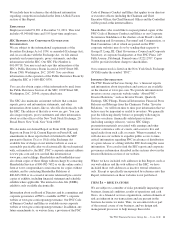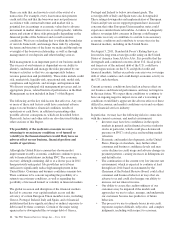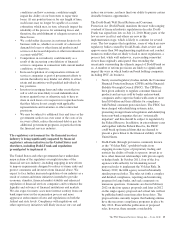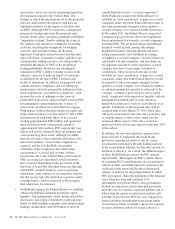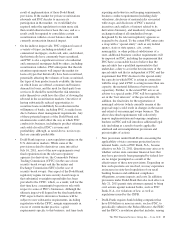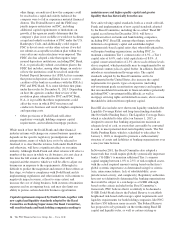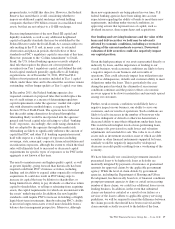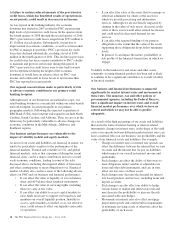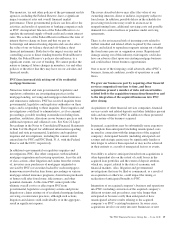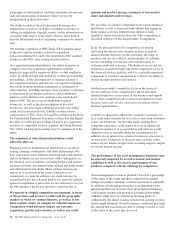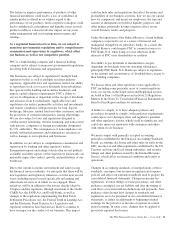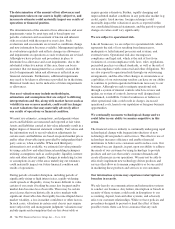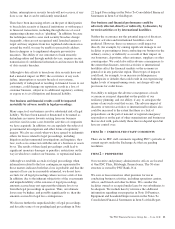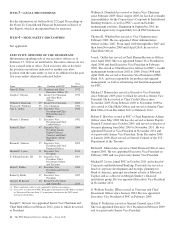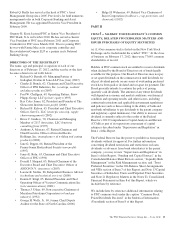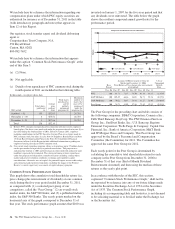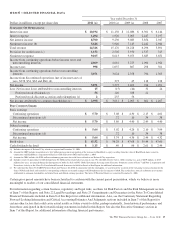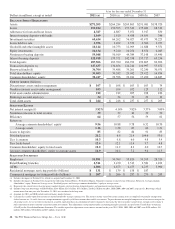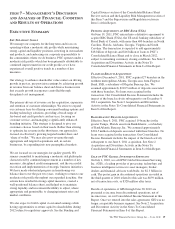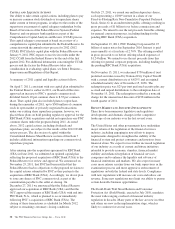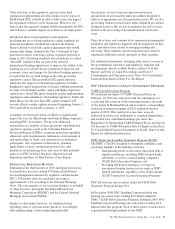PNC Bank 2011 Annual Report Download - page 30
Download and view the complete annual report
Please find page 30 of the 2011 PNC Bank annual report below. You can navigate through the pages in the report by either clicking on the pages listed below, or by using the keyword search tool below to find specific information within the annual report.The failure or negative performance of products of other
financial institutions could lead to a loss of confidence in
similar products offered by us without regard to the
performance of our products. Such a negative contagion could
lead to withdrawals, redemptions and liquidity issues in such
products and have a material adverse impact on our assets
under management and asset management revenues and
earnings.
As a regulated financial services firm, we are subject to
numerous governmental regulations and to comprehensive
examination and supervision by regulators, which affect
our business as well as our competitive position.
PNC is a bank holding company and a financial holding
company and is subject to numerous governmental regulations
involving both its business and organization.
Our businesses are subject to regulation by multiple bank
regulatory bodies as well as multiple securities industry
regulators. Applicable laws and regulations restrict our ability
to repurchase stock or to receive dividends from subsidiaries
that operate in the banking and securities businesses and
impose capital adequacy requirements. PNC’s ability to
service its obligations is dependent on the receipt of dividends
and advances from its subsidiaries. Applicable laws and
regulations also restrict permissible activities and investments
and require compliance with protections for loan, deposit,
brokerage, fiduciary, mutual fund and other customers, and for
the protection of customer information, among other things.
We are also subject to laws and regulations designed to
combat money laundering, terrorist financing, and transactions
with persons, companies or foreign governments designated
by U.S. authorities. The consequences of noncompliance can
include substantial monetary and nonmonetary sanctions as
well as damage to our reputation and businesses.
In addition, we are subject to comprehensive examination and
supervision by banking and other regulatory bodies.
Examination reports and ratings (which often are not publicly
available) and other aspects of this supervisory framework can
materially impact the conduct, growth, and profitability of our
businesses.
Due to the current economic environment and issues facing
the financial services industry, we anticipate that there will be
new legislative and regulatory initiatives over the next several
years, including many focused specifically on banking and
other financial services in which we are engaged. These
initiatives will be in addition to the actions already taken by
Congress and the regulators, through enactment of the Credit
CARD Act, the SAFE Act, and Dodd-Frank, as well as
changes to the regulations implementing the Real Estate
Settlement Procedures Act, the Federal Truth in Lending Act,
and the Electronic Fund Transfer Act. Legislative and
regulatory initiatives have had and are likely to continue to
have an impact on the conduct of our business. This impact
could include rules and regulations that affect the nature and
profitability of our business activities, how we use our capital,
how we compensate and incent our employees, the type and
amount of instruments we hold for liquidity purposes, and
other matters potentially having a negative effect on our
overall business results and prospects.
Under the regulations of the Federal Reserve, a bank holding
company is expected to act as a source of financial and
managerial strength for its subsidiary banks. As a result, the
Federal Reserve could require PNC to commit resources to
PNC Bank, N.A. when doing so is not otherwise in the
interests of PNC or its shareholders or creditors.
Our ability to pay dividends to shareholders is largely
dependent on dividends from our operating subsidiaries,
principally PNC Bank, N.A. Banks are subject to regulation
on the amount and circumstances of dividends they can pay to
their holding companies.
We discuss these and other regulatory issues applicable to
PNC, including some particular areas of current regulatory
focus or concern, in the Supervision and Regulation section
included in Item 1 of this Report and in Note 21 Regulatory
Matters in the Notes To Consolidated Financial Statements in
Item 8 of this Report and here by reference.
A failure to comply, or to have adequate policies and
procedures designed to comply, with regulatory requirements
could expose us to damages, fines and regulatory penalties
and other regulatory actions, which could be significant, and
could also injure our reputation with customers and others
with whom we do business.
We must comply with generally accepted accounting
principles established by the Financial Accounting Standards
Board, accounting, disclosure and other rules set forth by the
SEC, income tax and other regulations established by the US
Treasury and state and local taxing authorities, and revenue
rulings and other guidance issued by the Internal Revenue
Service, which affect our financial condition and results of
operations.
Changes in accounting standards, or interpretations of those
standards, can impact our revenue recognition and expense
policies and affect our estimation methods used to prepare the
consolidated financial statements. Changes in income tax
regulations, revenue rulings, revenue procedures, and other
guidance can impact our tax liability and alter the timing of
cash flows associated with tax deductions and payments. New
guidance often dictates how changes to standards and
regulations are to be presented in our consolidated financial
statements, as either an adjustment to beginning retained
earnings for the period or as income or expense in current
period earnings. In some cases, changes may be applied to
previously reported disclosures.
The PNC Financial Services Group, Inc. – Form 10-K 21


